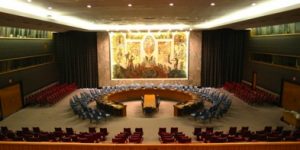
By: Alexander Sileo
Since the end of the Cold War, third-party interventions and multilateral initiatives have undergone a renaissance on the international stage. The United Nations (UN) was largely blocked from pursuing any international security objectives by a Security Council divided between the United States and the Soviet Union. The only major exception was the Korean War, a result of the Soviet Union’s boycott of the council. When the Soviet Union finally broke apart, many foreign policy experts predicted that governments would have an easier time pursuing multilateral objectives in a less polarized community of nations. Humanitarian crises in the 1990s as well as the wars in Afghanistan and Iraq have tampered these hopes of a more cohesive international community. Multilateral initiatives, however, are the only remaining viable option for U.S. foreign policy if the government is to effectively straddle its financial woes and preferred international presence.
The invasion of Afghanistan to oust the Taliban regime and capture Osama Bin Laden was widely supported among the domestic population of the United States. Public opinion, however, fell as the war began to drag on and the Bush administration began emphasizing the promotion of democracy within Afghanistan rather than the global war on terror. In particular, support waned in Afghanistan as the military casualty count grew to over 2,000 and
the financial cost of the war skyrocketed to hundreds of billions of dollars. The war in Iraq faced similar criticisms of a misguided mission and its shaky standing on international legal grounds. The United States would invade Iraq with a weaker coalition of support from the international community and the war would lead to nearly 4,500 casualties among the American military and second heavy financial burden for the U.S. government. The war in Afghanistan is finally winding down in 2014 while the Iraq war ended in 2011.
Despite President Obama’s attempt to pivot American foreign policy towards China and the Pacific, Afghanistan, Iraq, and the Middle East will continue to grab the attention of the White House. Public opinion of the United States in the Middle East and Central Asia has fallen substantially over the past few years. In Pakistan, nine out of every ten citizens disapprove of American leadership, partially due to the raid to kill Osama Bin Laden, and a majority of Pakistan’s citizens feel threatened by greater interactions with the western world. Disapproval of President Obama’s increased reliance on the drone program has also weakened support of his foreign policy agenda among foreign nationals across the Middle East and northern Africa. This dramatic fall in foreign public opinion of the United States comes from perceived unilateral actions by the United States. Unilateralism weakens popularity of America abroad.
The wars in Iraq and Afghanistan also impacted our relationships with key allies. France was significantly opposed to the war in Iraq while Germany disapproved of the United States’ impatience with the UN. The Iraq war was seen as a more unilateral initiative by the United States and President Bush’s disregard of the UN ostracized the international community and damaged the country’s relations with many key states in Europe and around the world. President Obama has rebuilt these relationships over his first term, but many countries remain apathetic to any multilateral initiatives led by the United States. Foreign relationships can only be sustained through continued coordination. Any deviation will result in the United States being more estranged from both new and hesitant allies.
New conflicts in Libya, Syria, and Mali have caused the United States government to reexamine its abilities to intervene in foreign conflicts. In Libya, the United States was able to use the UN and the North Atlantic Treaty Organization (NATO) to form a broad coalition that would enforce a no-fly zone as an internal rebel group pursued and eventually killed Muammar Gaddafi.
The Syrian conflict has continued for nearly two years as governments respond in a less unified manner. Russia has largely supported the Syrian regime led by Bashar al-Assad while the United States and the European Union (EU) have led humanitarian aid efforts. President Obama has signaled an increase in the U.S. support for Syria’s rebel groups, but there are numerous concerns regarding the loyalties of the armed factions involved in Syria. The civil war has led to large civilian casualties and it is unclear if there is any chance for a diplomatic solution.
The intervention in Mali has been a primarily French endeavor with support from the UN Security Council. The United States has aided French forces by transporting supplies and giving the French military access to American aerial fueling capabilities. While the French are running into problems with terrorist groups in northern Mali, the United States has largely managed to avoid the conflict and not commit to any large scale operation.
The United States has utilized three unique approaches for each conflict with varying results. The Libyan intervention led to the downfall of Gaddafi’s regime, but there are still security problems such as illegal arms trafficking and the recent attack on the American compound in Benghazi. Political tension, however, is preferred to armed conflict. The intervention in Mali is ongoing, but the French have quickly gained ground and are looking for a swift exit and transfer of power to a multilateral West African military force.
The Syrian conflict shows no signs of ending soon. The lesson from Syria seems clear: conflicts will rarely solve themselves and doing nothing threatens international security and empowers radical non-state actors. The United States must do something more than manage humanitarian aid to refugees if it wishes to preserve international stability. The interventions in Libya and Mali are certainly creating an environment more conducive to peace through the actions of international actors working with domestic groups within each country.
The United States must begin utilizing multilateral initiatives in order to strengthen democratic institutions and create more stability abroad. The American public has largely turned against interventions in foreign lands as the wars in Iraq and Afghanistan increasingly resemble the war in Vietnam: illegitimate and poorly managed. Efforts that utilize the legitimacy of the UN as well as allow the financial burden to partially fall on various allies would make these interventions increasingly viable and more acceptable in the eyes of the American people. A multilateral approach would also have more legitimacy among other nations that see the United States as imperialistic or domineering. This approach will require better communication between the State and Defense departments as diplomacy, foreign aid, and humanitarian relief are increasingly linked to military affairs. President Obama will also need to stress the importance of interventions in weakening radical non-state actors, strengthening international security, and providing new economic markets.
As the world becomes increasingly globalized, conflicts abroad will continue to affect the United States. The Obama administration must revamp its strategy for engaging hostile regimes and intervening in conflicts abroad. This will require careful diplomacy abroad and awareness of public opinion domestically. The United States can no longer scorn potential allies and still hope to achieve lasting international peace. An emphasis on a more multilateral American foreign policy is the only way for the country to stay immersed with the rest of the world while simultaneously resolving its financial problems. Although multilateral interventions have failed over the past twenty years, this approach is the only viable option for an engaged, but cognizant foreign policy. Some may see the failures of multilateral efforts as evidence of inherent flaws, but the solution is better management, not a complete abortion of this policy. The United States must save multilateral diplomacy in order to save itself on the world stage.

